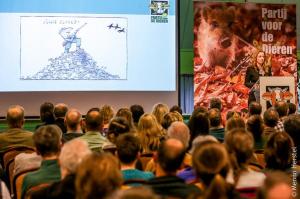Worldlog Settimana 49 – 2014
Domenica scorso si svolto il congresso del nostro partito. E’ stato una bella giornata! Il congresso è stato dominato dalle elezioni delle giunte provinciali e i consorzi delle acque. Perché marzo 2015 parteciperemo alle elezioni in dieci province e otto consorzi delle acque. Durante congresso del partito sono stati presentati e approvati i programmi del partito e la lista dei candidati. Sono fiducioso che avremmo una bella e fruttuosa campagna elettorale e che il nostro numero di rappresentanti sarà in forte aumento!
103.000.000 di polli in un paese molto piccolo. Questo vuol dire andare in cerca di guai, e che ora abbiamo. 220.000 polli e anatre sono stati gasati nelle ultime due settimane a causa d’influenza aviaria. E’ irresponsabile di continuare con l’agroindustria, dove si verifica un focolaio di malattia dopo l’altro. Undici anni fa, un terzo di tutti i polli olandesi è stato gassato, ben 30 milioni, e non abbiamo imparato nulla. Ho sollevato di nuovo anche questo durante l’ora settimanale delle domande orali nel parlamento. A differenza di animali selvatici, che sono costantemente esposto a qualsiasi tipo di virus, animali ammassate assieme in stalle sono molto vulnerabile ai virus. A causa del gran numero di animali e i molteplici contatti tra le imprese una malattia degli animali si diffonde rapidamente.
Volevo sapere dal sottosegretario cosa il governo dall’ultima grande epidemia d’influenza aviaria nei Paesi Bassi nel 2003, ha fatto per affrontare l’agroindustria. Alla nostra richiesta di una videoregistrazione durante la gassificazione dei polli è stato purtroppo risposto negativamente.
Non solo l’influenza aviaria rappresenta una minaccia per la salute pubblica. Più del 75% di tutta la carne consumata è contaminata da batteri resistenti agli antibiotici, secondo la ricerca di Beuc. Ciò significa che gli antibiotici aiutano meno quando sei malato. Questo sottolinea ancora una volta la necessità di porre fine all’agroindustria.
Il parlamento lascia che l’industria della produzione di latte ci può comunque espandere senza ostacoli. Il nostro emendamento che chiedeva di fermare l’espansione del settore lattiero-caseario è stato purtroppo respinto. Una crescita del settore lattiero-caseario significa automaticamente un aumento delle già esistenti problematiche del benessere degli animali e ambientali, perché anche questo non è affatto affrontato: un emendamento per il pascolo obbligatorio è stato respinto.
Questa settimana ho partecipato alla presentazione su imposta Ex’tax presso il Consiglio Economico e Sociale. L’idea dell’Ex’tax è lo spostamento del carico fiscale dal lavoro alle materie prime. Mentre la disoccupazione è attualmente molto elevata, per i datori di lavoro è molto poco attraente di assumere qualcuno a causa delle tasse elevate. I prezzi delle materie prime, scarse e dannose per l’ambiente, invece sono tenuti bassi. Ora che ci troviamo di fronte una grande sfida con il problema del clima e che c’è un alto tasso di disoccupazione, è questo il momento di cambiare il sistema fiscale di conseguenza.
Un articolo interessante sulla disponibilità di cibo nel mondo. Dobbiamo ritornare a scala piccola e regionalizzare per continuare a offrire cibo alla crescente popolazione mondiale.
Saluti, Marianne
Our party congress was held last Sunday. It was a great day! The congress focused on the Provincial Council and Water Board Elections. In March 2015, we will participate in elections in 10 provinces and 8 water boards. The party programmes and lists of candidates were presented and approved at the party congress. I am confident it will be a beautiful and successful campaign again and that our number of representatives will increase significantly!
103,000,000 chickens in a really tiny country. That is asking for problems, and problems are what we now have. Due to bird flu, 220,000 chickens and ducks have been gassed over the past two weeks. It is irresponsible to continue the bio-industry, where one after the other disease outbreaks occurs. 11 years ago, one third of all Dutch chickens were gassed, 30 million, and we have learned nothing. I therefore raised this matter again in the Lower House during weekly Oral question time. Unlike animals in the wild, which are constantly exposed to all kinds of viruses, animals that are stacked together in stables are very susceptible to viruses. An animal disease can spread easily due to the large numbers of animals and regular contacts between farms.
I wanted to know from the State Secretary what the Cabinet has done since 2003, when the previous major outbreak of bird flu occurred in the Netherlands, to address the bio-industry. Unfortunately, our request to use video recordings when gassing chickens received a negative response.
Not only bird flu poses a threat to public health. By now, even more than 75% of all meat consumed is contaminated with antibiotics-resistant bacteria, as was shown by research at Beuc. This means that antibiotics are less effective when you are ill. This emphasises the need again to put an end to the bio-industry.
The Lower House, however, allows expansion of dairy farming unimpeded. Our amendment that sought to halt expansion of dairy farming was rejected, unfortunately. An increase in dairy farming automatically means an increase in animal welfare problems and environmental problems which already exist, because this too is hardly addressed: an amendment for mandatory grazing was also rejected.
This week, I attended a presentation on Ex’tax at the Social and Economic Council. The idea behind Ex’tax is that taxes shift from labour to resources. As unemployment is currently really high, it is very unattractive for employers to hire someone due to the high taxes. The prices of scarce and environmentally harmful commodities, however, are kept low. As we are now faced with a major challenge with regard to climate problems and unemployment is high, this is the time to adjust the taxation system accordingly.
Interesting article about feeding the world. We have to go back to small scale and regionalisation to be able to continue feeding the growing world population.
Regards, Marianne



